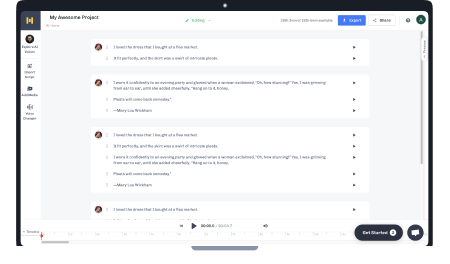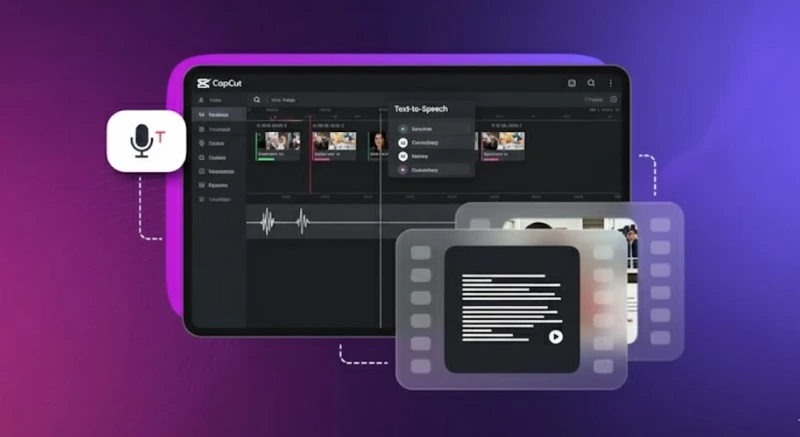Text to Speech for Commercial Use

Imagine a world where your business communicates effortlessly with customers, providing round-the-clock service and breaking down accessibility barriers with ease. This isn’t a distant future it’s the present, powered by advancements in text to speech technology. With realistic AI voices, TTS is more than a tool for converting written text into speech.
For content creation in a business, TTS technology offers seamless ways to generate professional and engaging voiceovers for explainer videos, advertisements, marketing campaigns, and eLearning materials. They can even create AI-generated voice tailored to match their brand identity, ensuring a unique and personalized auditory experience.
Whether you’re exploring the potential of using your own voice for branding or tapping into the power of AI-generated natural voices, the possibilities are endless.
Join us as we delve into how TTS technology is transforming industries, reshaping communication, and driving innovation across the commercial landscape one natural-sounding voice at a time.
TTS: Reshaping A New Era of Business
Globalization has made it crucial for Small and Medium Businesses (SMBs) to adopt advanced tools and technologies to enhance engagement and accessibility. The rise of TTS technology has transformed how organizations generate speech and interact with audiences through spoken audio.
By leveraging the synergy of speech synthesis with cutting-edge technologies like machine learning and artificial intelligence, businesses can now create the most advanced AI voices that sound remarkably human-like. This innovation has revolutionized voice overs, making them more natural and engaging, while also enabling the creation of custom voice solutions.
For instance, integrating TTS tools with advanced Natural Language Processing (NLP) techniques allows businesses to produce realistic and context-aware spoken audio. Similarly, combining TTS software with AI-powered chatbots results in more intelligent and personalized user interactions.
As the future of online communication emphasizes inclusivity, personalization, and efficiency, tools like text-to-speech will continue to empower businesses to create engaging content and enhance digital interactions. By adopting these technologies, organizations can position themselves as leaders in their industries while meeting the ever-evolving demands of their audience.
Why Choose TTS for Commercial Applications?

The strategic use of a TTS tools brings forth a myriad of benefits for businesses, and here are some crucial ones:
Cost-Effective
Let's look at a typical scenario where businesses need voiceovers for training videos, IVR systems, marketing videos and so forth. Traditionally, creating the said contents required expensive equipment and professional voiceovers. Text-to-speech technology creates quality audio files quickly and affordably for businesses.
By embracing the cost-effective nature of text-to-speech technology, businesses can streamline their operations while delivering high-quality audio content that meets the diverse needs of their audience.
Scalability
When it comes to growing your business, scalability is essential. An AI voice generator empowers you to meet the rising demand for content effortlessly. Cloud-based platforms, in particular, enable you to scale your production seamlessly, creating hours of high-quality, natural-sounding speech.
AI-generated voice sound not just humanlike but also provide at tone of uniformity at a large scale. However, it’s not just about increasing output. Integration with other tools is vital for streamlined workflow management. An AI voice generator offers compatibility with various systems, including content management platforms, customer relationship management software, and marketing tools. These integrations allow you to incorporate custom voice solutions and AI voices directly into your technology stack. Effortlessly adding realistic voice generator capabilities to your workflows enables you to create engaging videos and enhance interactive voice responses.
Customization
Text-to-speech software empowers businesses to create a unique identity by personalizing brand voices through the selection of specific AI voices that reflect their brand's personality. By customizing the voice, tone, and speed of speech output, businesses can deliver tailored user experiences that feel more engaging and relatable, adding a human touch to digital interactions.
This level of personalization becomes even more critical for businesses with a global footprint. Language barriers can often limit outreach and hinder growth in new markets. However, a multilingual AI voice generator breaks these barriers by supporting multiple languages, allowing businesses to communicate seamlessly with diverse audiences.
Fast Turnaround
It is an age old saying in business "time is money" in this case it turns out to be true. Traditional voiceover production is often time-consuming, requiring coordination with voice actors, studio bookings, and extensive editing. However, a text-to-speech tool using advanced speech synthesis can streamline this entire process, saving both time and effort.
By converting text into high-quality voice overs, businesses can generate professional audio content on demand. This eliminates delays caused by scheduling conflicts or availability issues, allowing for faster turnaround times. Whether producing a single recording or managing multiple files, text-to-speech technology automates the workflow, ensuring efficiency and freeing up resources for other priorities.
Applications of Text to Speech in Business
Here are some benefits of utilizing text to speech software in diverse industries:
eLearning
The educational sector benefits significantly from TTS technology by making learning materials more accessible and engaging. TTS tools convert textbooks and other written resources into audio while supporting diverse learning styles and needs, including those of students with dyslexia or visual impairments. Moreover, TTS enables language learning applications to provide pronunciation guides, enhancing the effectiveness of language acquisition tools.
Advertising and Marketing
Text-to-speech (TTS) technology are revolutionizing media and entertainment by enhancing accessibility and creativity for a global audience. TTS transforms books, podcasts, and web content into audio, catering to individuals with visual impairments or reading difficulties.
Innovative uses include podcasts like Myself, I Am and That, where generative AI creates human-like voices, eliminating the need for recording. TTS also aids game developers by generating character voices and multilingual dialogue quickly and affordably, while supporting low-budget animations and films.
This versatile technology expands audience reach, supports personal use, and redefines content creation across industries.
Customer Support
Text-to-Speech (TTS) is transforming customer service by addressing pain points like long wait times, high call volumes, and inefficient routing. By automating routine inquiries and providing self-service options, TTS ensures customers receive accurate, timely support, even after hours.
With support for multiple languages, TTS enables businesses to serve a diverse customer base seamlessly. It reduces agent workload, streamlines operations, and delivers consistent, 24/7 support, significantly enhancing customer satisfaction.
Software and Apps
TTS functionality can be seamlessly integrated into any software or application using APIs. A Text to Speech API serves as a software interface that converts written text into spoken audio, enabling applications to generate natural, human-like voices.
This feature allows apps to read text aloud, narrate stories, or make short videos more engaging. By incorporating these capabilities, you can create software or applications that are more user-friendly, accessible, and language-inclusive, enhancing the overall experience for diverse audiences.
Top TTS Software for Commercial Use
TTS can be applied to any operation of your business. The following software will not just grow your business but make it thrive:
Murf AI
Convert text into high quality, human-like expressive voice with Murf’s AI text to audio tool. Murf offers hundreds of real 200+ human-like voices in 20+ languages, built with ethically sourced data trained on authentic linguistics and models. Even though it has all the customization features available for an ai voice generator in the market following are the features that set them apart:
Top Features:
- Murf’s voice cloning feature allows users to create custom voices with unique moods, tones, and dialects.
- Murf’s voice changer feature can convert any recording to a studio quality voiceover, eliminating noise or distortions.
- With Murf, you can tailor voiceovers to perfectly align with your brand’s unique tone and style while adjusting the pitch, speed, pronunciation, pauses, and emphasis.
- Murf offers a robust API for developers and businesses by streamlining the integration of its voice generation capabilities into products, applications, and workflows.
Elevenlabs
The platform's voices are natural, capable of conveying various emotions and tones, creating lifelike audio output. Elevenlabs supports 29 languages and multiple accents, allowing businesses to communicate effectively with global audiences.
Top Features
- Offers intuitive voice customization with precise tuning options for personalized audio output.
- Provides instant and professional voice cloning, creating lifelike voice clones in multiple languages and accents.
- Features a Dubbing Studio with detailed control for video localization, including transcript editing and timing.
- Includes a Projects feature for a complete workflow to direct and edit long-form audio content, ideal for audiobooks and videos.
Speechify
Speechify offers 100+ AI-generated voices across 30+ languages, users can tailor the voice by adjusting accent, tone, and style. Additionally, Speechify offers extensive customization, allowing users to modify pitch, speed, and voice settings to match their project requirements.
Top Features
- Speechify converts your uploaded documents into downloadable audio files and can read various formats like PDFs, web pages, Word files, and emails.
- You can use Speechify on multiple platforms, including desktop, mobile devices, Chrome, Safari, iOS, Mac, and Android.
- It includes premium celebrity voices like Gwyneth Paltrow and Snoop Dogg.
- With a photo-to-audio feature, Speechify allows offline listening by reading captured text aloud.
- Speechify’s API enables you to add text-to-speech functionality to your mobile apps and websites for natural-sounding, accessible audio content.
Natural Reader
Natural Reader provides high-quality AI-generated voices that deliver a natural sound, making it suitable for casual listening or narration. The software also offers customization options, allowing users to adjust the reading speed and view real-time word highlighting as the text is read aloud.
Top Features
- Easily create, edit, and download audio scripts with intuitive tools and advanced settings.
- Generate lifelike voiceovers with customizable tones and emotions for a natural delivery.
- Access advanced, context-aware voices, including multilingual and cloned options.
- Create and refine scripts effortlessly using ChatGPT-powered tools for writing and translation.
- Download audio in mp3/WAV formats or export scripts as text and subtitle files.
Amazon Polly
Amazon Polly is a cloud service that converts text into lifelike speech. You can use Amazon Polly to develop applications that increase engagement and accessibility.
Top Features
- Provides fast responses for real-time use cases like dialogue systems.
- Offers diverse male and female voices in numerous languages, including neural styles like the Neural Newscaster.
- Pay-per-use model with no setup costs, scalable with application growth.
- Reduces local device resource needs, supports all voices/languages, and delivers instant speech improvements.
Google Text to Speech
Google Cloud text to speech leverages DeepMind’s speech synthesis expertise to create natural-sounding narration from text with a humanlike intonation. However, the dearth of realistic and emotionally expressive voices, limited customization options, and the lack of accurate pronunciation are some factors that prompt users to explore alternative text to speech solutions.
Top Features
- With Google TTS, you can access 220+ voices in 40+ languages.
- You can adjust the pitch, speed, and tone the way you want!
- You can customize the speech with SSML tags for adding pauses, numbers, date and time formatting, and pronunciation.
- You can download the audio in different formats like MP3, Linear16, OGG Opus, or WAV. This means you can play it on almost any device.
Moving Forward
While steering through the future of text to speech software, one can anticipate the emergence of the following possibilities.
Multimodal Integration
The future of text to speech commercial tools goes beyond traditional speech synthesis. Multimodal integration incorporates gestures, facial expressions, and other visual elements into TTS applications.
Emotional Intelligence
One of the most exciting predictions involves the infusion of emotional intelligence into synthetic voices. TTS systems will be designed to convey not just words but also emotions.
Businesses that embrace and leverage these advancements will undoubtedly gain a competitive edge in the future, where advanced AI voices will become a powerful tool in the B2B arsenal.
Murf AI: The Best AI Voice Generator
Murf Studio is a robust AI voice generator for creating professional and high-quality voiceovers for various applications, including YouTube videos, training modules, audiobooks, podcasts, and presentations. With support for over 200+ unique and natural AI voices in 20+ languages, Murf ensures a global reach while making content accessible to a diverse audience. It's unique Murf Gen2 features sets the tool apart from any of the tools found in the market:
- Variability: Generate multiple voiceover versions of a line with one click and choose the best fit.
- Say It My Way: Record and voice-direct the model to replicate your speech's intonation, pace, and pitch, ensuring precise customization.
- Word-Level Emphasis: Add nuanced emphasis to specific words for effects like urgency or irony, offering granular control over vocal elements.
For businesses seeking efficient, cost-effective, and high-quality audio creation services, Murf is a transformative platform at the forefront of voice technology.
Meet Murf Falcon: The Fastest, Most Efficient Text to Speech API
Murf Falcon is engineered to deliver human-like speech at an industry leading model latency of 55 ms across the globe. Use Falcon to deploy AI voice agents that not only talk like regular humans, but also deliver the speech at blazing fast speed with ultra precision.
Falcon is the only TTS API that consistently maintains time-to-first-audio under 130 ms across 10+ global regions, even when processing up to 10,000 calls at the same time. Falcon delivers uninterrupted, natural speech. No lag, no clipped phrases, no robotic tone.
Engineered for Real-Time Performance
Falcon’s architecture is tuned specifically for ultra-low latency and responsiveness:
- Model latency under 55 ms
- Time-to-first-audio under 130 ms
- Edge deployment across 10+ regions for global consistency
Its lightweight, compute-efficient model outperforms larger LLM-based TTS systems on context precision and response timing delivering premium naturalness without inflated infrastructure demands.
Human-Like Speech, in Any Language
Falcon ensures voices sound fluent and expressive:
- 35+ languages, 150+ expressive voices
- Code-mixed multilingual output without accent distortion
- 99.38% pronunciation accuracy
- Conversational prosody for natural tone, rhythm, and pauses
Falcon separates how words are pronounced from the unique qualities of the speaker’s voice, preventing odd tone changes. This also enables the voice to switch languages smoothly in the middle of a sentence.Your AI voice doesn’t just speak multiple languages, it sounds native in each.
Integrates in Minutes
Falcon fits easily into modern development stacks:
- RESTful API
- Python, JavaScript, and cURL SDKs
- Works with Twilio, Anthropic Claude, Discord, and more
Go from API key to live call in minutes, no complex provisioning or specialized infrastructure needed.
Stable and Cost-Efficient at Scale
- Supports 10,000+ concurrent calls with no latency drop
- Predictable performance worldwide via edge routing
- On-prem deployment option for full internal control
- Priced at 1¢ per minute, reducing voice agent costs by up to 50%
Fast everywhere. Accurate always. Affordable at scale. Try Murf Falcon now!

Frequently Asked Questions
Can I use text to speech for commercial use?
.svg)
Yes. Many AI voice generators offer commercial licenses or subscriptions that allow businesses to utilize the text to speech technology for various applications, including voice overs for videos, customer service applications, accessibility features, and more.
Is there a free text to speech converter for commercial use?
.svg)
Some text to speech converters offer free versions, while others have subscription plans. Google text to speech provides free access to its basic features, including commercial usage. However, be sure to review the terms of service and any usage restrictions before integrating AI voices into commercial projects.
In which industries can text to speech tools be commercially applied?
.svg)
Text to speech software finds commercial applications across various industries, including elearning and education, entertainment and media, healthcare, automotive, gaming, finance, eCommerce, and more.
What are some applications of TTS in customer service and communication?
.svg)
TTS is widely used in customer service and communication for:
- Automated voice response systems
- Interactive voice menus
- Voicemail greetings
- Call center assistance
- Virtual assistants for handling inquiries
Are there applications of TTS in the financial sector for commercial purposes?
.svg)
Yes, TTS is employed in the financial sector for:
- Reading financial reports and updates
- Providing voice alerts for transactions and account activities
- Generating summaries of market trends in the form of an audio file
- Enhancing accessibility in financial apps for visually impaired users
Can TTS be employed in retail and e-commerce for commercial benefits?
.svg)
Certainly, TTS can be beneficial in retail and e-commerce for:
- Creating natural sounding voices for product descriptions and advertisements
- Improving the accessibility of online stores for visually impaired customers
- Implementing voice-enabled virtual shopping assistants
- Generating audio files for marketing and promotional materials.
Is it legal to use TTS software for ads?
.svg)
Yes. You can use a TTS software for ads, but ensure to check all the licenses for commercial use for the tool are updated.
How do I know if a TTS tool allows commercial use?
.svg)
This information would be given on all the official websites for the TTS tool. Ensure that you read all the terms and conditions along with the terms of use given on the website.





.webp)


.webp)






